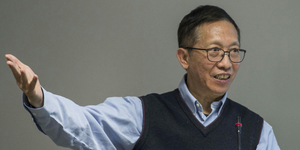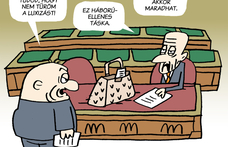It's an iron law of politics that public figures insist that their strategy, whatever it is at that time, is perfect, while their rivals are reeling in the midst of a crisis. Even if they know that the situation is perhaps a little more complicated.
That's why internal party documents attract so much attention: advisers give honest, self-critical assessments of the situation, leaving campaigning to one side. This report, which was written for the MDF's leadership, parts of which are now available to the public, is the exception that proves the rule. It is a collection of false or tired cliches, little better than an average piece of daily journalism. Furthermore, it seems the author is preoccupied less with the facts than with his or her own desires, or those of the leadership.
First, a technical point: such documents tend to strike a pragmatic tone. "Let's leave the guff to one side, let's see what's really happening," is the tone of most such essays. The in-house expert's task is to protect party leaders from being deceived by their own campaigns. That requires an objective stance. But this document is full of pathos, sighing that "in the 2006 parliamentary elections, the MDF was the only party that did not lie and did not try to win voter affection by making irresponsible promises. Crossing the 5 per cent barrier to gain parliamentary representation showed that there exists in Hungary a voting public that wants to see coherent right-wing policies, traditional values, moves against institutionalised state waste and a normal political life."
Let's leave aside the proposal to abolish inheritance tax, which would certainly have led to tax increases elsewhere - hardly a responsible or realistic promise. Let's look instead at the idea of "Fidesz without Orban", that the author of this piece of homework dreams of. The strategist believes that "according to the first script, genuinely conservative and Christian Democrat members of Fidesz and the Christian Democratic People's Party will turn their back on Orban and his team and endorse a strategy of constructive opposition. We can also imagine a situation where these groups oust Viktor Orban as internal conflicts within the party grow, along with all his Mikolas and Semjens. Then, and only then, can we envisage cooperation between MDF and Fidesz."
There's an awkward fact, however. If Fidesz didn't depose Orban after the party's spring fiasco, then they certainly won't after their triumph in the local elections. And nor does the author seem worried about the fact that Fidesz's party conference a few weeks ago invested even more authority and decision-making power in Orban. There is latent potential for conflict within Fidesz, but there's no reason to believe they can't be overcome. Lajos Kosa, the mayor of Debrecen, is possibly the potential leader of a some kind of future potential palace coup against Orban, but to insist is just polemical exaggeration.
"I'm being realistic. Anybody trying to find a common right-wing voice is deceiving himself if he thinks he can exclude Viktor Orban." These are the words of Gabor Fodor, Free Democrat spokesman. If even a leader from one of the governing parties concedes that the leader of the largest opposition party is unavoidable, then a spin doctor whispering from the rear should perhaps try and keep his feet on the ground.
The MDF can have many different kinds of relationship to Fidesz. It would make sense to make gestures to Fidesz in the hope of getting some favours in return. It would be rational on the part of MDF to offer their cooperation in exchange for formal recognition of their independence. It would also be defencible for them to make overtures to Fidesz's 'doves' in the hope that they will persuade Orban to settle his differences with the MDF. But the MDF expert pins all his hopes on stoking internal party resistance to Orban.
"The MDF's main political task is to offer constructive criticisms of the reforms. Its main campaigning task is to create a genuine right wing that stands against Fidesz. This will grow into the political force that will replace the left wing." It's strange for a party to see criticising the government as a political task, while confronting the government's enemy is merely a campaigning task. The quotation suggests that the MDF's goal is to bring down the current government. Furthermore, it wants to do this by itself, without outside help. But neither the author nor his party's leadership dares to wonder what will happen if his party neither reaches nor even approaches the absolute majority required in parliament to achieve this aim - while perhaps gaining enough seats to serve as a viable coalition partner for Fidesz.
The writer's prognosis can never come to pass. He wants to see a centre party closed to both political wings. But there is no such thing. You have to be open in at least one direction. But the MDF's dreams are based on the idea that it is a major party. Over the past five years, the MDF has never managed to achieve the same level of popularity as its leader, Ibolya David. Are they really wise to pin all their hopes on the results of one or two opinion polls, even if they did show better results than normal?
















